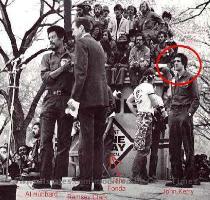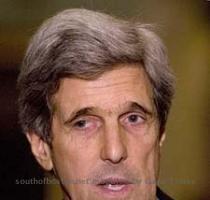DC’s elected ’shadow representative’ gets no vote or salary, yet 4 people still want the job
By APTuesday, August 24, 2010
4 people vy to be elected DC’s shadow congressman
WASHINGTON — Every two years, voters here pick a shadow congressman, a position with little clout and one responsibility: lobbying to make D.C. the 51st state.
There’s no salary and no ability to vote in Congress, but four residents still want the decades-old gig that has few perks aside from a basement office on Pennsylvania Avenue.
The current office holder proposes bringing attention to Washington’s plight by hoisting a 51-star flag over the city government building. His challenger, a 25-year-old law school student, plans a summer lobbying campaign and says he was put on the planet to win statehood. The two Democrats face each other in a September primary and more candidates will join in the November general election. But many voters are still in the dark about the contest.
“What is a shadow representative?” asked the moderator at a recent candidate forum. “What do you all do?”
Current shadow Mike Panetta explains it this way: the person lobbies to make D.C. a state, but he and his challengers are essentially running “to say who is going to be the best volunteer for the district.”
The nation’s capital already has a member of Congress, Democrat Eleanor Holmes Norton. She has been the city’s delegate since 1991, but isn’t allowed to vote on the House floor. To push for full representation, city voters created the shadow representative position and two “shadow senators” in the 1980s, though only the representative is up for election this year. The idea wasn’t new. A handful of territories created similar positions before becoming states. Once their state was admitted, the office holders often became their state’s first real representatives.
D.C.’s 600,000 residents give it a comparable population to Wyoming, Vermont and North Dakota, which each have two senators and a congressman. And the city was on the verge of getting a voting seat in Congress under a bill passed by the Senate in 2009, but it stalled without members of the House voting on it.
Panetta, who was first elected shadow in 2006, says it’s not the first time he’s seen the district disappointed. He sees the position as a marketer for the district’s desires: getting voting representation in Congress and authority over its own laws and budget, which Congress currently must approve. But Panetta, 39, is also a realist.
“I go with what is possible at the time as far as statehood or voting rights,” said Panetta, who has a job in marketing and public affairs.
So far, his success has been with humor. In 2005, before his election as shadow, he created a campaign to rename RFK stadium “Taxation Without Representation Field” to to draw attention to the city’s lack of a vote in Congress. In 2006, he formed a D.C. Olympic curling team. The team only went curling maybe three times, but they got quite a bit of press.
“They were poking fun at us, obviously, but each of those stories had our message,” said Panetta, who has also targeted congressmen who don’t support D.C. rights with messages against them in their home states.
But don’t expect to find him on Capitol Hill, hobnobbing with voting members.
“You don’t need another guy up there running around, pretending to be a congressman,” Panetta said.
Panetta’s Democratic opponent, Nate Bennett-Fleming, accuses him of not being aggressive enough. A graduate of Morehouse College in Atlanta, he is finishing a law and government program through Harvard and the University of California, Berkeley. He says with the Democrats in control of the House and Senate, now is the time to get statehood for the district.
“I view this as a time when we can make a change, and we can make history,” said Bennett-Fleming, who has interned in Norton’s office and worked on John Kerry’s 2004 presidential campaign.
He wants to organize a “Freedom Summer” in 2011 where residents would lobby for statehood, and he would also organize on college campuses. Bennett-Fleming, who just meets the age requirement to run, says the job is for a young person.
“I was put on this planet to win statehood for the citizens of D.C., and if I don’t do it it won’t be done,” he said during the candidate forum.
The winner of the Democratic primary on Sept. 14 will face two opponents in November: the green party candidate, a grandmother, and a Republican who is a retired congressional staff member. But three-quarters of the city’s registered voters are Democrats, so the other candidates are considered longshots.
“My chances are not good,” acknowledges Republican candidate Nelson Rimensnyder, who proposes making the district a territory, which he says would give it more rights, and creating a D.C. delegate to the Senate.
The district’s only actual representative in Congress, Norton, says whoever the winner is can help mobilize residents and work with city groups. And she doesn’t mind having an understudy.
“I wouldn’t care,” Norton said, “if they deputized every resident as a shadow.”


